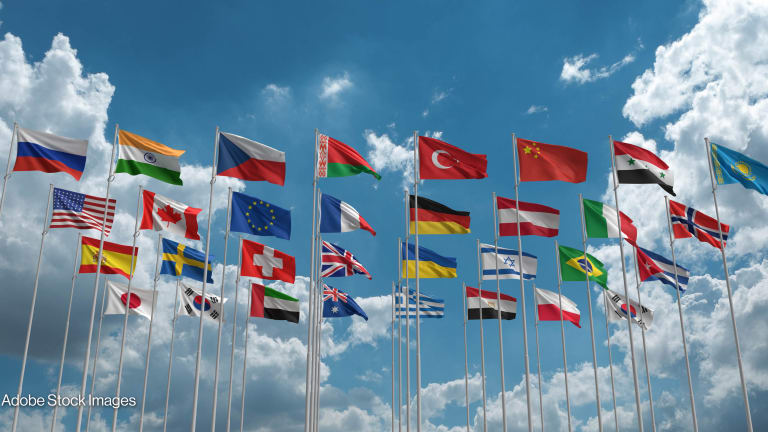
Penny Mordaunt, the United Kingdom’s new secretary of state for international development, has hit the ground running. She has sent a strong signal that she believes in aid. She has embraced her department and its mission, told parliament that the U.K. is committed to getting aid into the humanitarian crisis in Yemen, and visited the violently displaced Rohingya in Bangladesh. She has swiftly moved to demonstrate the Department for International Development’s commitment to leave no one behind by announcing a global disability summit next year.
A positive start from new DFID head, aid insiders say
A week into the job, the U.K. aid industry is watching closely for early clues about new DFID head Penny Mordaunt's approach to aid.
For a big leadership impact, however, DFID’s new leader needs to turn these initial instincts into a bold agenda. And there’s much she can do if she acts quickly.
When I entered the U.S. Agency for International Development in 2010 as part of new leadership team appointed by President Obama, there were similarly high expectations and enthusiasm for reform. What did we do about it? We quickly set an ambitious, transparent, and measurable agenda for reform. Its key elements were simple: Gather and use evidence to make decisions; increase the quality and number of staff; triple our spending through local partners; embrace science, technology, innovation, and partnerships as key enablers of impact at scale; set some big goals and relentlessly focus on results.
So, how can the new secretary of state burnish the U.K.’s development leadership and impact?
1. Change the tone of the recent conversation in the U.K. about aid: Focus on the positive, acknowledge the challenges.
When I was at USAID, we faced a similar challenge and we took the decision to talk frankly to the U.S. Congress and media about our challenges — they knew about them anyway. We also started talking a lot more about our successes, with a powerful evidence base to back them up. The U.K.’s aid budget is rarely wasted or stolen. It can be improved, but the idea that waste is a dominant theme is not based on reality. U.K. aid has been responsible, amongst other things, for immunizing over 65 million children, helping the sharp reduction of child mortality, and supporting 53.6 million people, including 26.4 million women, in developing countries to access financial services. Furthermore, U.K. aid is deeply in the national interest. The U.K. thrives in a world of greater equality, rule of law, and action that mitigates climate change, pandemics, and human suffering. Wars, famines, ecosystem destruction, and economic decline abroad cost U.K. taxpayers directly and indirectly far more than 0.7% of gross national income. This is the case the new secretary of state needs to make, over and over again, throughout her tenure at DFID.
2. Focus on how to maximize the impact of U.K. aid.
“Value for money” is a floor, not a ceiling. The real prize is about getting bigger results by using U.K. assistance to crowd in financing from other public and private partners to achieve really big results at scale. That means, for example, using science, technology, and innovation to reach many more people.
For example, hundreds of millions in South Asia and Africa still lack the minimum basic tools such as identification cards, a bank account, voter registration, electricity, and internet connection that are essential to access services and participate in the economic and political life of their country. Yet we know these are problems that can be addressed with new technology at declining cost and increasing speed. For example, after decades of expensive, incomplete efforts to give all Indians an ID, the Aadhaar digital identity program in India enrolled 1.1 billion people over seven years at a cost of about £1 ($1.34) per person. And across sub-Saharan Africa, where 400 million people lack access to any electricity, the continent is poised for a technological leap akin to the introduction of the mobile phone. Solar panels and other solutions are rapidly providing cheaper, cleaner, and far healthier energy than kerosene, diesel, and dung, saving lives and igniting economic growth.
But be warned, all bold ventures carry risk, and that means some programs will fail. This work is hard, but worth it.
3. Pick some core themes and set goals around them.
Mordaunt has already highlighted disability as a major issue, and called an international summit next year. This fits in well with the bigger theme at the heart of the United Nations Sustainable Development Goals: Making sure we leave no one behind. Including everyone means including those hardest to include. And people with disabilities have to overcome discrimination and structural challenges. Fixing those things requires addressing deeper challenges that will help many more.
In addition, DFID leadership has been far too quiet on climate change. It is imperative that Mordaunt recognises the poorest are hit hardest by the impact of climate change. She has the opportunity to demonstrate global leadership by scaling up the U.K.’s own climate commitments, including on ending fossil fuel subsides.
U.K. aid is rarely a game changer alone, so Mordaunt needs to build a big tent, inviting others to shape the agenda, and share credit with others.
4. Love the department, embrace the people, and give them the tools they need to succeed.
DFID is full of dedicated, mission-driven people who often live in tough places, and work on challenging and sometimes unpopular agendas. If she wants to make a big difference, they are her best asset.
For more U.K. news, views and analysis visit the Future of DFID series page, follow @devex on Twitter and tweet using the hashtag #FutureofDFID.








